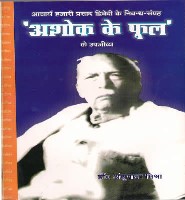
AACHARYA HAJARI PRASAD DVIVEDI KE NIBANDHA SANGRAHA ASHOK KE PHUL KE UPJIVYA
Author: DR .ANSHUMALA MISHRA,AU, ,
Download PDF
published by mpasvo
EDITION : FIRST
PB/HB : PAPERBACK
SUBJECT : HINDI
LANGUAGE : HINDI,SANSKRIT, BANGALA
publication year 28 november 2006
total copy : 1000
ISBN : 978-81-905742-3-5
copy in stock : 500
book cost : 150rs
contact : 9935784387
purchase this book from mpasvo
Dr.Anshumala Mishra, Assistant Professor
Allahabad university
Allahabad up India
BIOGRAPHYWith a PhD degree in india, dr. Anshumala joined the Allahabad University as a lecturer , and became a faculty member in 2005. In addition to her academic activities, . dr. mishra is considered a world-class poet and Hindi grammarian .she have published over 30 papers in the major international journals, and wrote 2 books 1 ugc project .
ABSTRACT
A personal or cultural value' is an absolute or relative ethical valuecontradictory], the assumption of which can be the basis for ethical action. A value system is a set of consistent values and measures. A principle value is a foundation upon which other values and measures of integrity are based. Those values which are not physiologically determined and normally considered objective, such as a desire to avoid physical pain, seek pleasure, etc., are considered subjective, vary across individuals and cultures and are in many ways aligned with belief and belief systems. Types of values include ethical/moral value, doctrinal/ideological (religious, political) values, social values, and aesthetic values. It is debated whether some values which are not clearly physiologically determined are intrinsic such as altruism and whether some such as acquisitiveness should be valued as vices or virtues. Values have typically been studied in sociology; anthropology; social psychology; moral philosophy and business ethics.
Values can be defined as broad preferences concerning appropriate courses of action or outcomes. As such, values reflect a person’s sense of right and wrong or what “ought” to be. “Equal rights for all”, "Excellence deserves admiration", and “People should be treated with respect and dignity” are representative of values. Values tend to influence attitudes and behavior. For example, if you value equal rights for all and you go to work for an organization that treats its managers much better than it does its workers, you may form the attitude that the company is an unfair place to work; consequently, you may not produce well or may perhaps leave the company. It is likely that if the company had a more egalitarian policy, your attitude and behaviors would have been more positive.wikipedia.org
THIS BOOK IS BASED ON THE VALUES IN THE TEXT OF JAY SHANKAR PRASAD GREAT HINDI WRITER AND POET